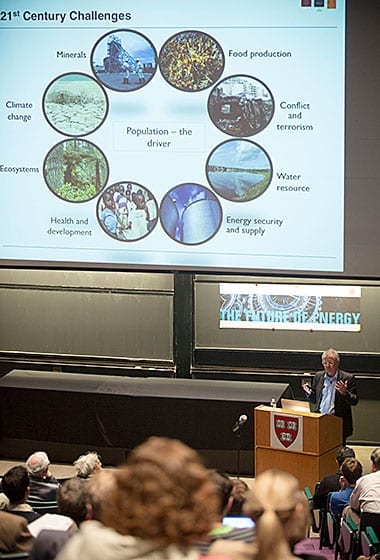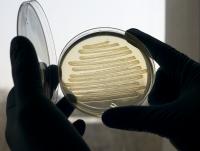“Most likely, people in the future will take a cocktail of molecules that can slow ageing and prevent common age-related diseases.”
David Sinclair, an Australian scientist and entrepreneur working on increasing human health, productivity, and lifespan, could be close to discovering the fountain of youth, and it’ll come in a tablet.
At TEDxSydney 2013 the Professor of Genetics at Harvard Medical School will share a new concept about why we age and how it should be possible to develop medicines to reverse it.
“There are many molecules we know now of that can slow down aspects of ageing in mice. The question is no longer an ‘if’, but a ‘when’,” says Sinclair. “Most likely, people in the future will take a cocktail of molecules that can slow ageing and prevent common age-related diseases.”
The new class of superdrug – from the man who discovered resveratrol, a plant compound found in red wine, as an anti-ageing molecule – could possibly see people living decades longer.
“We’re not sure how much longer people will live but in mice these molecules prevent many diseases of old age, including diabetes, cancer and heart disease,” he says. “The molecules were initially discovered by studying a longevity gene in yeast cells called SIR2. The new molecules that target the human SIR2 are hundreds of times more potent that these original molecules. These are in early stage clinical trials, so it will be at least a few years before they are on the market.”
Sinclair’s preoccupation with ageing is driven by the belief that this knowledge can be used to prevent and treat both rare and common diseases, helping people live healthier, disease-free lives. His work at Harvard and at a new lab established at the University of New South Wales, focuses on genes and small molecules that mimic exercise and calorie restriction, a diet that slows the pace of ageing in animals.
He says: “Ageing is the root cause of most major diseases. By addressing the root causes of these diseases we should be able to have a large impact on human health. Am I playing God? Absolutely not. I’m no different than other researchers looking for ways to make people healthier for longer. It’s proven that the healthier you make people, the less burden they are on society.”
Not content to stay in the lab, Sinclair has also founded four biotechnology companies. These are Sirtris, which treats age-related diseases and was sold to GlaxoSmithKline for a reported US$720 million in 2008; OvaScience, which aims to improve female reproductive health and IVF; Cobhar to treat type 2 diabetes; and Genocea, which develops vaccines against malaria, chlamydia, tuberculosis, pneumonia, and cancer.
You could say it’s in his genes; Sinclair’s parents are trained biochemists and growing up in St. Ives, in the northern suburbs of Sydney, his parents would talk about their work at the dinner table. He enrolled in a Bachelor of Science at the University of New South Wales. Doing bench research in molecular biology in the lab of Professor Ian Dawes at UNSW, a molecular biologist and geneticist, was a turning point.
“You couldn’t drag me out of the lab after that,” he says.
The Latest Bing News on:
Slowing ageing
- Health Spotlight: Following ‘Life’s Essential 8’ could slow agingon May 9, 2024 at 11:59 am
Exercising and eating right are key factors in staying healthy, but the American Heart Association says it doesn’t stop there.
- How aging clocks tick: New study points to stochastic changes in cellson May 9, 2024 at 7:13 am
According to the authors, it is above all crucial to ascertain if such aging clocks can show the success of interventions that slow the aging process or harmful factors that accelerate aging. Using ...
- When Does It Become Unsafe For Your Aging Parent To Live Alone?on May 8, 2024 at 3:15 pm
In the absence of a sudden event, like a fall, the slow decline in physical ability may not be obvious ... Here I’ll address just two of these six, as very common areas of risk for aging loved ones.
- Syncing brain and muscle circadian rhythms slows agingon May 8, 2024 at 10:17 am
Our brain clocks, known as circadian rhythms, tell our muscles when to repair, our skin when to regenerate, and our metabolism when to power up or down.
- Daily briefing: Rejuvenating the immune system could slow ageingon May 7, 2024 at 5:00 pm
Studies in mice raise the tantalising prospect of treating immune ageing to control age-related diseases. Plus, concerns grow over cows becoming a permanent reservoir for the bird flu virus and a ...
- Multivitamins May Slow Cognitive Aging by Two Yearson May 7, 2024 at 5:00 pm
But what if something as simple as a daily multivitamin could help protect your brain and slow down this age-related decline? Recent research suggests this may be the case as scientists dive deeper ...
- Equinox’s new $40k membership aims to slow down agingon May 7, 2024 at 3:11 pm
Optimize by Equinox will deliver members a range of in-depth assessments and guidance—to the tune of $40,000 a year.
- Golfing-great Gary Player not slowing down at age 88, staying fit and focusing on foundationon May 2, 2024 at 1:29 pm
Gary Player, one of golf's all-time greats, is 88 years young, but he remains very active and focusing on his foundation.
- Gen Alpha Is Prepared to Pay Big to Slow Agingon May 2, 2024 at 7:52 am
Thorne’s consumer report looks at how Americans are prioritizing health and wellness alongside the financial implications for parents of Gen Alpha.
- High blood pressure drug called 'rilmenidine' dramatically slows aging in animalson May 1, 2024 at 2:41 pm
A drug used for high blood pressure, known as rilmenidine, may also be effective in slowing the aging process.
The Latest Google Headlines on:
Slowing ageing
[google_news title=”” keyword=”slowing ageing” num_posts=”10″ blurb_length=”0″ show_thumb=”left”] [/vc_column_text]The Latest Bing News on:
Preventing age-related diseases
- Consuming Olive Oil May Lead to 28% Lower Risk of Dementia-Related Deaths, According to a New Studyon May 8, 2024 at 11:14 am
After several statistical analyses were run on the data, the results suggest that participants who consumed more than 7 grams (about ½ tablespoon) of olive oil per day had a 28% lower risk of dying ...
- Blue Light and Aging Eyes: Preventing Long-Term Damageon April 26, 2024 at 9:52 am
EXPLORE Health Money Travel Food Style Book Club Classifieds #ZoomerDaily Policy & Perspective Arts & Entertainment Stars & Royalty Sex & Love ...
- A cheap drug may slow down aging. A study will determine if it workson April 21, 2024 at 10:14 pm
"If you could help prevent multiple problems at the same time ... given the drug's long history of safety and the possible benefits in delaying age-related disease. "I walk a lot, I hike, and at 65 I ...
- Vaccines targeting chronic diseases show promise in combatting age-related conditionson April 16, 2024 at 5:01 pm
chronic obstructive pulmonary disease (COPD), and cancer. Healthy habits like calorie control and regular physical exercise help prevent age-related disorders. However, small-molecule therapies ...
- Perinatal Probiotic Supplementation in the Prevention of Allergy Related Disease: 6 Year Follow Up of a Randomised Controlled Trialon April 15, 2024 at 5:00 pm
Maternal probiotic supplementation given to a general population of women appears to have an ongoing preventative effect on the cumulative incidence of AD until school age, however this did not ...
- Local scientists are on the cutting edge of anti-aging research. When can we expect results?on April 4, 2024 at 5:00 pm
Local researchers including Harvard scientists George Church and David Sinclair are making progress on drugs to rejuvenate cells and prevent age-related diseases. This is part of a series about ...
- Expert Tips for Preventing Age-Related Muscle Losson February 15, 2024 at 12:52 pm
Here, experts explain what sarcopenia is, the health risks, and how to prevent it. Sarcopenia is defined as age-related loss of muscle mass, but it’s more complex than that—it’s a progressive muscle ...
- What Can You Do About Age-Related Illnesseson November 7, 2023 at 2:07 pm
To ensure that you do not have to worry about age-related illnesses and that you can take proactive steps to protect yourself from them, here is what you can do to help prevent health conditions as ...
- What Is Dry Age-Related Macular Degeneration?on September 19, 2022 at 5:00 pm
Two clinical trials, Age-Related Eye Disease Studies (AREDS and AREDS2 ... and eating a well-balanced diet can prevent and slow the onset of AMD. Healthline has strict sourcing guidelines ...
- New hope for preventing age-related macular degenerationon February 23, 2009 at 4:00 pm
These antioxidant vitamins were found to prevent the progression of age-related macular degeneration in the 10-year Age-Related Eye Disease Study conducted by the National Eye Institute of the ...
The Latest Google Headlines on:
Preventing age-related diseases
[google_news title=”” keyword=”preventing age-related diseases” num_posts=”10″ blurb_length=”0″ show_thumb=”left”]











